- Home
- Hammond Innes
The Black Tide Page 7
The Black Tide Read online
Page 7
‘Where?’ Ferrers asked.
‘Estimated probable position somewhere south-west of Sri Lanka.’
‘And the radio schedule.’
‘Twice weekly. Same as Aurora B’
‘Okay,’ he said. ‘I’ll look up the Aurora B details, let them have a print-out of that. Then we’ll see what else we can cobble together.’
Standing there, totally ignored now, I was surprised at the speed with which their attention had switched, Spurling already hunched over the VDU checking with the computer, Ferrers reaching for the nearest binder, searching for the fiche on which the microfilmed details of the Aurora B casualty has been stored. ‘Two of them can’t have blown up.’ Fairley pushed a hand up through his fair hair, which was now as rumpled as the rest of him. ‘Two GODCO tankers in two months, it’s not possible.’
‘What about the Berge Istra and the Berge Vanga?’ Ferrers said without looking round. ‘Norwegian and just as good a stable as GODCO.’
Spurling looked up from the telex he had been reading and said, ‘She left the Abu Dhabi port of Zayed 18.00 hours January 5.’ He turned to Fairley. ‘When did she miss her radio schedule?’
‘Yesterday afternoon. It’s in the telex.’
‘Yes, but it doesn’t give the time.’
‘I checked the Aurora B schedule,’ Fairley told him. ‘She was reporting in at 14.00 hours Tuesdays and Fridays.’
‘So this one could be the same time, but Mondays and Thursdays.’ Spurling had the Lloyd’s Maritime Atlas open at the Indian Ocean page and was pencilling figures on a slip of paper. ‘That’s it then. West or south-west of Sri Lanka. Just about where the Aurora B missed her schedule. Previous schedule would have been roughly between Muscat and Karachi, so if she really is a casualty, then it could have happened anywhere between there and Sri Lanka.’
Fairley nodded. ‘You’re thinking it could be fraud.’
‘We’ve had radio frauds before. It became quite fashionable a couple of years back.’
‘That was cargo,’ Ferrers said over his shoulder. Cargo that didn’t exist, shipped in vessels that didn’t exist or else had their names borrowed for the occasion. And all of them owned by companies Lloyd’s wouldn’t consider insuring. But GODCO. That’s something entirely different.’ His machine suddenly rolled out a sheet of paper, which he tore off and handed to Spurling. ‘That’s the Aurora B casualty information. Not very much to go on.’ He suddenly seemed conscious of the fact that I was still standing there. ‘I’d better run you up to the station. You’re not supposed to be here and this doesn’t concern you.’
‘You’ve nothing more you can tell me about the Petros Jupiter?’ I asked.
‘No, nothing.’
‘Except,’ Spurling said, ‘that the lead underwriter for the Petros Jupiter is the same as for these two tankers. Same solicitors, too.’
‘That’s confidential,’ Ferrers cut in sharply.
No question now of getting anything more out of them. Ferrers hustled me out of the building and into his car, driving fast, in a hurry to get back. I envied him his total involvement. He really seemed to enjoy it. ‘We’re just backroom boys really, but when it’s a case of fraud – well, it gets quite exciting at times.’ We were crossing the Colne, now a black gut between the white of snow-plastered buildings. ‘Our job is to feed information to the marine solicitors, in extreme cases to the police.’ He grinned at me as we slithered on the roundabout. ‘When Lloyd’s is faced with marine crooks, then it’s our wits against theirs and every case different. It’s teamwork mainly, and sharp memories, a bloody good filing system and a computer.’
He skidded the car to a standstill outside Colchester station booking hall, then scribbled a name and a telephone number on one of his cards and handed it to me. ‘Forthright & Co., they’re the marine solicitors for the three syndicates run by Michael Stewart.’ He pushed open the door for me. ‘A Mr Saltley. Give him a ring while you’re in London. He wants to speak to you.’
‘About the Petros Jupiter?’
He hesitated. But all he said was, ‘Just give him a ring, that’s all.’ And he added, leaning across to talk to me as I pocketed his card and stepped on to the hard-packed snow, ‘He’s a nice guy is Michael Stewart. Lives only a few miles away, and if this tanker really has gone missing, then he’s in trouble. That’s what I hear anyway. So go and see Saltley, will you.’ He drove off then, slamming the door shut as the Cortina’s wheels churned the snow, and I went into the station wondering why he thought I could help when all I was interested in was the Petros Jupiter.
3
It was just after twelve-thirty when I got back to London. It had been a slow journey with several stops and as I made my way to a call box I was feeling tired and cold, my mind still on the Petros Jupiter, knowing I would have to move fast if I was to catch up with Choffel in Karachi. I hadn’t much money, and an advance on the book was the only chance I had of raising the air fare.
But when I phoned the publishers the man who had written to me had already left for lunch. I made an appointment for three that afternoon, and then, because it was still snowing and I didn’t imagine the sort of lodging I could afford would have a phone, I rang Forthright & Co. Again I was out of luck, Saltley’s secretary informing me he was out and she didn’t know when he would be back. She tried to discourage me from ringing later, but when I told her my name, she seemed to brighten up. Mr Saltley, she said, would definitely like to see me, and as soon as possible. He was attending a twenty-first birthday luncheon party at the Savoy and would be back by four at the latest. Could I ring again then?
I had some food at the station buffet, then got my suitcase out of the lock-up and took the tube to Stepney Green. Outside the station the Mile End Road seemed strangely quiet, the sound of the traffic muffled by a dirty carpet of salted slush. I crossed the road and headed south for a boarding house I had used before. It was in a long street of terraced houses down towards the river, and when I knocked at the door, it was opened by the same big-bosomed, bold-eyed landlady. I had forgotten her name until she reminded me. It was Mrs Steinway. She put me in the basement, which was the only room she had vacant and, after settling in and having a quick cup of tea with her, I walked back through the snow to Stepney Green station and took a train to South Kensington.
Jordans, the publishers to whom I had sent my book, were a small firm specializing in wildlife and natural history. It was just after three when I reached their office in Queen’s Gate, one of those white porticoed buildings almost opposite the Natural History Museum. A pretty little girl with a streaming cold took me up to Ken Jordan’s office on the first floor, which was little bigger than a partitioned cubicle, the ceiling showing part of the ornate plaster design of a larger room. There was a window looking across to the Museum and the walls were lined with bookshelves that overflowed into stacked heaps on the floor.
Jordan proved to be a rather intense individual with sandy hair and eyes too close together, his face long and the lips turned up at the corners in what appeared to be a perpetual smile. He had my typescript on the desk in front of him, on top of an untidy litter of books, letters and galleys, and as soon as I was seated, instead of talking about my book he went into a long monologue about the one I ought to write. ‘You owe it to your wife’. He said that several times. He wanted me to start again, writing the whole story of Balkaer from Karen’s point of view …
‘Write it in the first person. Imagine you’re really your wife, everything from her angle, right?’ His pale, rather protuberant eyes stared at me urgently. ‘I’m sure you can do it. Her feelings as she’s cleaning up those half-dead birds, what she thinks about the government, the oil companies, the men who run the tankers, how the idea gradually forms in her mind – immolation, a spectacular, suicidal gesture—’
‘It wasn’t suicide,’ I said quickly.
‘No, no, of course not.’ He gave a high little laugh, almost a giggle. ‘But that’s how the public see it now. And it�
��s the public that buy books. So you give them what they want, use your imagination. A little invention. Dramatise it. Build it up.’ And then he had the nerve to ask me whether she had tried it before.
‘How do you mean?’ I could hear the hostility in my voice, feel anger building up inside me.
‘Just that. Had she tried it before—’ He stopped there and opened the folder, leafing through the pages Karen had typed so carefully. ‘That oil slick you described. Not the first one.’ He found the page he was looking for. It was near the end. ‘The one in November. Now, if she tried to set fire to it and failed … you see what I’m getting at? It would make it so much more dramatic – her feelings when it didn’t work, the sense of anti-climax.’ He paused, staring at me. ‘A nice build-up, you see, to the end of the book – very exciting, very moving … the reader having been through it all before when it didn’t work, and then, the next time, knowing it’s for real, that she’s going to kill herself.’
‘She didn’t mean to,’ I said again. ‘She wasn’t thinking of suicide, only of setting light—’
‘No, but you see what I’m getting at. So dramatic, eh? And that’s what you want, isn’t it, to make the point she was trying to make? The news story, that’s over, finished now. What we want is something much more personal, something deeply moving.’ He was leaning forward, his voice quiet and persuasive. ‘I’m sure you can do it, Mr Rodin. It’s just a question of putting yourself in your wife’s – er, sea boots—’ he smiled, trying to lighten his words – ‘seeing it as she might have seen it, and building the whole thing up, dramatising it, making it exciting, sensational even – it needs fictionalising, you see.’
‘You aren’t interested then in what I’ve already written?’
‘No.’ He shook his head. ‘No, not really.’ And he added quickly as I began to get to my feet, ‘It’s nicely written. Don’t misunderstand me. You can write. But these are difficult times. I don’t think we could sell it, not now. But the book I’ve just outlined … I’m sure we could sell that. It has excitement, emotional involvement, action – it could be a very moving book. We could try one of the Sundays too. It could make a good two or three-part serial.’
‘But not if I wrote it the way I saw it, the way it really happened?’
He shook his head. ‘No.’ He banged the typescript shut. ‘What we’re talking about is a first book. Trevor Rodin. Nobody’s heard of you, you see. You’re new, unknown. So we’ve got to give it depth, excite people, give the reader something to get his teeth into – husband writes the full intimate story of his wife’s final, terrible decision. See what I mean? It’s moving. It would tear at their hearts—’
‘No.’ I was on my feet now, staring down at him, hating him for his callous rejection of all those months of work, for the way he was trying to get me to twist the truth to fit his own idea of what was marketable.
‘Please,’ he said, leaning forward again and gazing urgently up at me. ‘Don’t misunderstand me – I’m only trying to help. Our job as publishers is to produce books that authors like you write, and then to market them. Each book is a joint venture as it were, the author investing his time and his expertise, the publisher his money. It costs money to launch a book and my job is to see that the final product in each case is something people will want to buy.’ And he added, ‘Take my advice, Mr Rodin – I have some experience – write it the way I have suggested, from your wife’s point of view, building it up to the point where she is so emotionally desperate she goes out to blow the ship up, and herself—’
‘It was an accident,’ I said angrily. I could see so clearly what he was driving at, and there was a part of me that was prepared to accept that he was right, that this was the way to handle it if it was to capture the imagination of the public. But it wasn’t the truth, it wasn’t the way it had happened. ‘She didn’t mean to kill herself.’
‘How do you know? You can’t be sure what was in her mind.’ And he added, ‘A little author’s licence … what difference does it make? Or can’t you do it? Is that the trouble, that you don’t feel you’re a good enough writer—’
‘I could do it,’ I said angrily. ‘But I won’t.’ I reached across his desk and picked up the typescript. If I stayed in that untidy office any longer I knew I’d be tempted. Everything seen through her eyes, using my imagination – I’d always wanted to be a writer and I needed the money. Of course I could do it, the scenes already flashing through my mind. But in the end my memory of Karen would be blurred, the reality of her and what she had tried to do lost in a ghost creature of my own imagination.
‘You won’t do it then?’
‘No.’
‘I’m sorry.’ He pushed his chair back and stood facing me. ‘If you change your mind—’
‘I shan’t.’
‘But if you do, don’t leave it too long. A few months and there’ll be another tanker on the rocks spilling oil somewhere else.’ He held out his hand, limp and cold, and I left him, hurrying down the stairs and out into the street, clutching the typescript. The pavements were tight-packed ice and the ornate Victorian edifice of the Museum facing the Cromwell Road was picked out in thick white snowlines.
I was so angry I felt like flinging the typescript into the snow-clogged gutter. I had been sure they would take it, ever since I had received Jordan’s letter. I had been so certain I would come out of that meeting with a contract and a cheque for the advance that I hadn’t even checked the tramp rates or looked at the Shipping Index; I hadn’t the slightest idea what the chances of a berth were for anyone who had been ashore as long as I had.
My breath smoked in the cold air and I became conscious of the traffic building up, moving sluggishly through the snow as London headed for home early. It seemed to be getting colder by the minute, the wind north-westerly now, the snowflakes like glass flying in horizontal lines past my face. How disappointed Karen would have been, all those evenings spent listening to me as I had read passages aloud in the lamplight, all the typing! She had felt at times almost as involved with it as I was. And now … How long would it be before the Corsaire reached Karachi? Or had the ship already arrived? Perhaps she would be anchored outside with all the other freighters waiting for a berth … But then I remembered the new harbour. It would be finished now and once the Corsaire docked, Choffel could disappear into the labyrinth of the bazaars. Or maybe he’d find a berth on some vessel headed for Japan, Australia, some distant part of the world beyond my reach.
The man’s escape and the book’s rejection became fused in my mind, the anger of despair gripping me as I tramped through the snow, the cold eating into me. And then suddenly there was a new thought in my head. Dramatise it, the man had said, so that’s what I’d do. I’d re-write it, the whole story, her death, everything. And the end of it would be my search for Aristides Speridion or Henri Choffel, or whatever he might be calling himself when I caught up with him. I’d find him somehow. I’d find the bastard, and when I’d done with him, then I’d write it all down, just as it happened – for Karen’s sake, for the sake of all those birds, for my own peace of mind. And reaching that decision, the emptiness, the hopeless feeling of depression was gone, determination taking hold.
I don’t know why, but I was suddenly remembering my mother, conscious of the same obstinate streak that had made her go it alone, bring up a child on a nurse’s pay in post-Mau Mau Nairobi, and later in the Gulf, in Dubai, where she had died of pulmonary pneumonia from overwork. I could hardly remember what she looked like, only that she was small and neat, and that she’d a lot of guts, a lot of nervous energy that had burned her up before she was 40. That and the climate, and the men she couldn’t resist.
Back at South Kensington station, I went straight to a call box and rang Forthright. Saltley was back from his luncheon at the Savoy, but he was on the phone. I hadn’t enough change to hang on, so I rang off and stood there, feeling very alone as I watched the milling crowd of office workers hurrying to get home before railway l
ines froze and roads became impassable. They were all so busy, so engrossed in their own worlds. I tried again a few minutes later and the girl said he was still talking. I had to ring twice more before she was finally able to put me through and a quiet, rather abrupt voice said, ‘Saltley here.’
Ferrers had clearly briefed him about me, and of course he had read the papers. He said he’d like to see me as soon as possible, but he had a rather urgent case on and would be tied up for a couple of hours at least. I suggested that perhaps I could see him at his office the following morning, but he said he would be preparing a brief and in court most of the day. He hesitated, then told me that, because of the weather, he had arranged to stay the night at his club. ‘You a sailing man, by any chance?’
‘I had the loan of a boat once in Karachi,’ I told him. ‘A dinghy really.’
He seemed relieved. ‘Then at least you won’t be entirely out of your depth.’ And he suggested I had supper with him at the Royal Ocean Racing Club in St James’s Place. ‘Seven-thirty suit you? And if the bar’s crowded, then we’ll go into the Fastnet Room and talk there.’
I had two and a half hours to kill. I went into the Science Museum, which being a government building was pleasantly warm, and stayed there until it closed, idling the time away activating all the working models, the steam engines and looms and laser beams. There was hardly anybody left when they pushed us out into the night. The wind had dropped, the air still and deathly cold. I took the Underground to St James’s Park, bought an evening paper and read it over a cup of coffee in a cafeteria off Victoria Street. The City page carried the year’s results of the Norwegian subsidiary of a large British shipping company. They had half their ships laid up and had been operating at a loss throughout the second half of the year.
I wished to God I hadn’t seen it, for it did nothing to lift my morale as I went out into the frozen streets of London again. They had a dead look now, hardly any traffic. I walked up to St James’s Park. There wasn’t a soul there. It was as though I were the ghost of somebody who had returned after some terrible science fiction disaster. The water was a black pit under the bridge. The ducks and wild geese stood motionless on the ice, the flat white covering of snow scuffed with the imprint of their feet. The scene matched my mood. I could no longer conjure the soft Welsh lilt of Karen’s voice, or see her standing there beside me. I was alone now, intensely, intolerably alone, with only anger and hatred for company.

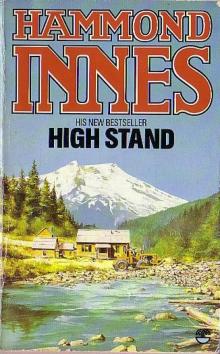 High Stand
High Stand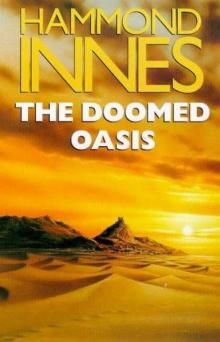 The Doomed Oasis
The Doomed Oasis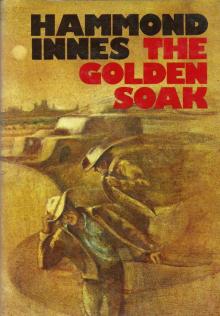 Golden Soak
Golden Soak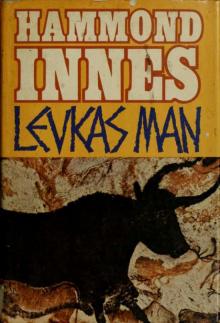 Levkas Man (Mystery)
Levkas Man (Mystery)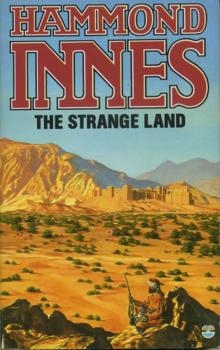 The Strange Land
The Strange Land Dead and Alive
Dead and Alive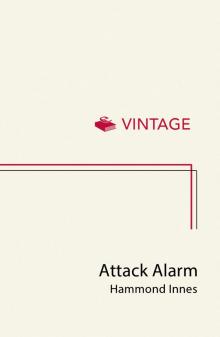 Attack Alarm
Attack Alarm The Strode Venturer
The Strode Venturer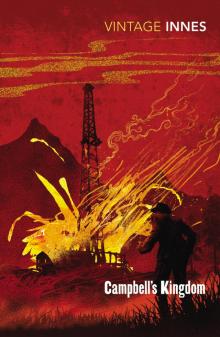 Campbell's Kingdom
Campbell's Kingdom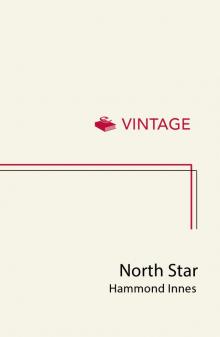 North Star
North Star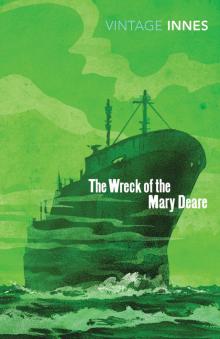 The Wreck of the Mary Deare
The Wreck of the Mary Deare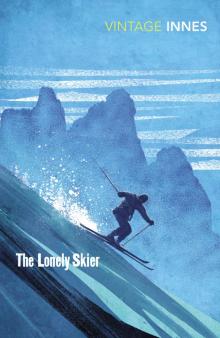 The Lonely Skier
The Lonely Skier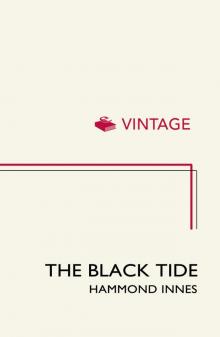 The Black Tide
The Black Tide The Trojan Horse
The Trojan Horse Medusa
Medusa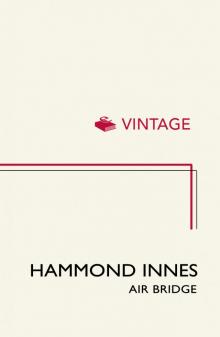 Air Bridge
Air Bridge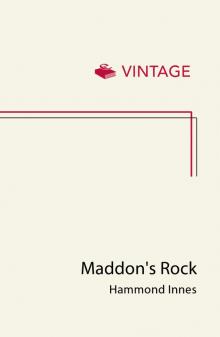 Maddon's Rock
Maddon's Rock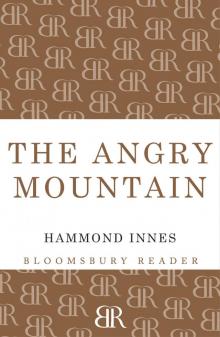 The Angry Mountain
The Angry Mountain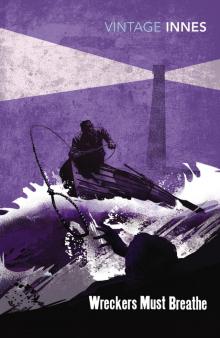 Wreckers Must Breathe
Wreckers Must Breathe Solomons Seal
Solomons Seal The White South
The White South